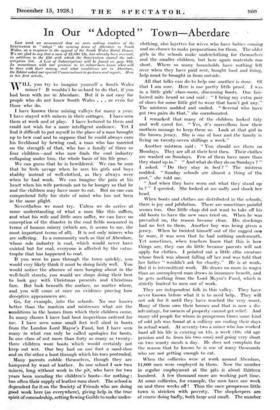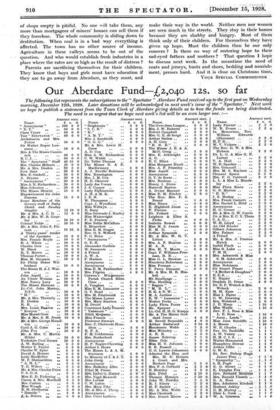In Our "Adopted
Town Aberdare
Last week we announced that we were asking readers of the SPECTATOR to " adopt " the mining town of Aberdare in South Wales, as a response to the appeal of the South Wales Rural Deans. We are glad to say that a sum of £2,040 12e. has already been received, in addition to the £50 with which the SPECTATOR started the sub- scription list. A List of Subscriptions will be found on page 910. In accordance with our promise to let subscribers know what will be done with their money, and what conditions are in Aberdare, the Editor asked our special Commissioner to go down and report. Here is his first article.
WELL you try to imagine yourself a South Wales' miner ? - It wouldn't be so hard to do that, if you'' had been with me in Aberdare. But it is not easy for people who do not know South Wales . . . or even for those who do.
I have known these mining valleys for many a year. I have stayed with miners in their cottages. I have seen them at work and at play. I have lectured to them and could not wish for a more intelligent audience. Yet I find it difficult to put myself in the place of a man brought up to hew coal and to suppose that he could always earn his liVelihood by hewing coal, a man who has married on the strength of that, who has a family of three or four children—and who now finds the coal industry collapsing under him, the whole basis of his life gone.
We can guess that he is bewildered.' ' We can be sure that he feels savage when he sees his girls and boys shabby instead of well-clothed, as they always were when he ' had work. We can imagine the pain at his heart when his wife pretends not to be hungry so that he and the children may have more to eat. But no one can comprehend fully his state of mind who has not been in the same plight.
Nevertheless we must try. Unless we do arrive at some understanding of what a man like this suffers, and what his wife and little ones suffer, we can have no conception of the disaster in the coal fields measured in terms of -human misery (which are, it seems to me, the most important terms of all). It is not only miners who are suffering. In a community such as this of Aberdare, whose sole industry is coal, which would never have existed but for coal, everyone is affected by the catas- trophe that has happened to coal.
If you were 'to pass through the town quickly, you would very likely think it must be doing fairly well. You would notice the absence of men hanging about in the well-built streets, you would see shops doing their best to look gay with Christmas presents and Christmas fare. But look beneath the surface, no matter where, and you will come at once ,on evidence proving how deceptive. appearances are.
Go, for, example, ,into the schools. No one knows better then the masters and mistresses what are the eonclitions. in the homei from which their children come. In many classes I have had boot inspections ordered for me. I have seen some small feet well shod in boots from the Jsondon Lord Mayor's Fund, .but I have seen many in what can only be called apologies for boots. In one class of not more than forty as many as twenty- three children wore boots 'which would certainly not keep out wet. One boy had on one foot a sand-shoe and on the other a boot through which his toes protruded.
Many parents cobble themselves, though they are haMpered by want of leather. In one school I saw two miners, long without work in the pit, who have for two years been mending the children's boots—for nothing too often their supply of leather runs short. The school is dependent for it on the Society of Friends whO are doing good work here (as everywhere), giving help in the true spirit of comradeship, setting Sewing Guilds to make under- clothing, also layettes for wives who have babies coining and no chance to make preparations for them. The older girls in the schools make underclothing for themselves and the smaller children, but here again materials run short. Where so many households have nothing left over when they have paid rent, bought food and firing, help must be brought in from outside.
All that folks can do to help one another is done. Of that I am sure. Here is one pretty little proof. I was in a little girls' class-room, discussing boots. One fair- haired mite heard us and said : " I bring my extra pair of shoes for some little girl to wear that hasn't got any." The mistress nodded and smiled. " Several who have got two pairs do that," she corroborated.
I remarked that many of the children looked tidy and well cared for. " Yes, it's marvellous how their mothers manage to keep them so. Look at that girl in the brown jersey. She is one of four and the family is living on twenty-seven shillings a week."
Another mistress said : " You should see them on Mondays. They are all at their best then. Their clothes are washed on Sundays. Few of them have more than they stand up in." " And what do they do on Sundays " I asked. " Do they stay in bed ? " The mistress nodded. " Sunday schools are almost a thing of the past," she told me.
" And when they have worn out what they stand up in ? " I queried. She looked at me sadly and shook her head.
When boots and clothes are distributed in the schools, there is joy and jubilation. There are sometimes painful scenes too. One little chap did not want to take off his old boots to have the new ones tried on. When he was prevailed on, the reason became clear. His stockings had no feet to them. Another boy was being given a jersey. When he twisted himself out of the ragged one he wore, it was seen that lie had nothing underneath. Yet sometimes, when teachers know that this is how things are, they can do little because parents will not apply for clothes. I pointed out a little elfin creature whose frock was almost falling off her and was told that her father " wouldn't ask for charity." He is at work. But it is intermittent work. He draws no more in wages than an unemployed man draws in insurance benefit, and he gets nothing from the Lord Mayor's Fund, which is strictly limited to men out of work.
They are independent folk in this valley. They have never known before what it is to need help. They will not ask for it until they have reached the 'very worst. Many of them own their houses and that is now a dis- advantage, for owners of property cannot get relief. And many old people for whom in prosperous times some kind of odd job was found at a colliery are ending their days in actual want. At seventy-two a miner who has worked hard all his life is existing on 15s. a week (10s. old age pension and 5s. from his two sons) and going very short on two scanty meals a day. He does not complain for the reason that he knows he is one of many thousands who are not getting enough to eat.
When the collieries were' at work around Aberdare, 11,000 men were employed in them. Now the number in regular employment at the pits is about thirteen hundred. A few thousand more are working part time. At some collieries, for example, the men have one week on and three weeks off ! Thus the once prosperous little town is stricken with poverty. The shopkeepers are of course doing badly, both large and small. The number of shops empty is pitiful. No one will take them,- any- more than mortgagees of miners' houses can sell them if they foreclose. The whole community is sliding down to destitution. When coal is in a bad way everything -is affected. The town has no other source of income. Agriculture in these valleys seems to be out of the question. And who would establish fresh industries -in a place where the rates are so high as the result of distress ?
Parents are sacrificing themselves for their children: They know that boys and girls must have education if they are to- go away from Aberdare, as they must, and make their-way in the world. Neither men nor women are seen inuch in the streets. They stay in-their holies because they are shabby and hungry. Most of them -think only of their children. For themselves they hive given up hope. Must the children then be our only concern ? Is .there no way of restoring hope to their sad-eyed • fathers and mothers ? That question I hope to discuss next week.. In the meantime the need of coats and jerseys, bootS and shoeS, bedding and nourish ment,' presses hard. And it is cloSe On Christmas, 011ie,
YOUR. SPECIAL COMMISSIONER.









































 Previous page
Previous page